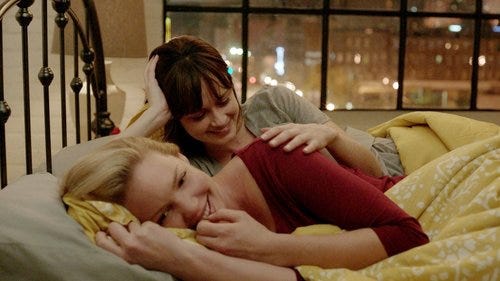jenny's wedding
Film, 2015, 2 stars
Written and Directed: Mary Agnes Donoghue
There are almost no words to describe what a missed opportunity this was. Let me be very clear on this – both Katherine Heigl and Alexis Bledel can act. I’ve seen seven seasons of Gilmore Girls that tell me that Bledel has terrific comic timing and some dramatic chops. As for Heigl, much of her Grey’s Anatomy work was outstanding, and 27 Dresses showed what she could do with a decent script behind her.
These two women had no chemistry onscreen. None. Moreover, Alexis Bledel’s six or so lines could have been uttered by a talking tree, so cliched and devoid of meaning were they. They had Tom Wilkinson play the father who is messed up about his daughter coming out, and he’s morose and awful. For heaven’s sake, they even almost managed to screw up a performance by a Meryl Streep descendent, though Grace Gummer running around muttering “Happy people don’t have dead grass” over and over was a highlight.
Jenny’s Wedding traces the journey of Heigl’s character, Jenny, as she attempts to break it to her parents and siblings that not only is she gay, she wants to marry Kitty (Alexis Bledel) and start a family. At first we see the compulsory happy family idyllic house in a small town with parents and three perfect kids, with the compulsory cliched pressure for their only single daughter to get married. Then Jenny unleashes her bombshell, and the family begins to fall apart, taking the neighbourhood and their overly-chatty town with them.
The script is just not very good. With all this potential firepower behind her, Mary Agnes Donoghue seriously should have accidentally created a better film. I applaud all her good intentions, but with the misguided earnestness of the main character, the overreactive attitudes of the parents, the zany disapproving townfolk, this is an absolute archaic mess. 1980 called and it wants its film back.
We needed somebody to cheer for, but Jenny and Kitty share only one semi-believeable scene, where they are walking around Nordstrom’s looking at wedding dresses and are spotted happily kissing by Jenny’s sister. This scene had a rare moment of spontaneity that was sadly missing from the well-meaning but wooden remainder of the film. Our two heroines like to spend their time on the opposite sides of the room to each other, and when they do share brief moments of togetherness or intimacy, these are hurried, embarrassed, or wooden.
Yes, I cried in the end at the pivotal reconciliation moment between Jenny and her father, but these were cheap emotional heartstrings being pulled, rather like tearing up at a cute puppy on a dog food commercial. It felt transient and unreal, and I felt cheated for investing time and effort into getting to know these characters at all.
We are even cheated of the titular wedding itself. Surely if you’ve spent 90 minutes building up to a big event, both parties in the wedding should be permitted to speak? There should be declarations! A kiss! Adoring looks! Instead we get a quick walk down the aisle and 30 seconds of Jenny muttering some perfunctory speech that doesn’t come across as either heartfelt or romantic. Meanwhile Kitty looks on rather like a shocked deer dressed in white caught in headlights.
If I sound annoyed it’s because, irrationally, I am. The writer of this film wrote Beaches, one of my favourite films of all time! This could have been so great. It had star power. It had a serious filmmaker, and some budget. It could have been that deep, funny, moving exploration of family dynamics that conservative America actually needs to see on its screens as they adjust to this new world of marriage equality.
Yes, it's very worthwhile making an empathetic film that explores how small-town America deals with this kind of upheaval. If only that’s what this was. It’s an important subject, something many are grappling with. It deserved better treatment.
This was Jenny’s Wedding, but even in a film that focuses on a single person, you can’t make the rest of the world around her a cardboard cutout of humanity. Even the single-minded conservatives of the world that this film is evidently pitched at will see right through this poor exercise in preaching for tolerance, and that’s so very sad.




